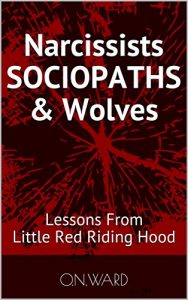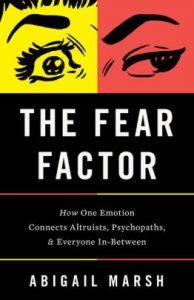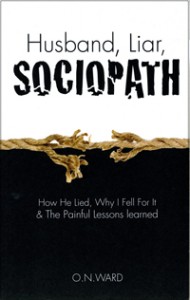The Fear Factor: How One Emotion Connects Altruists, Psychopaths, and Everyone In-Between: Part B
As I mentioned last week, I recently read the book The Fear Factor: How One Emotion Connects Altruists, Psychopaths, and Everyone In-Between by Dr. Abigail Marsh, Associate Professor of Psychology and Interdisciplinary Neuroscience at Georgetown University. Her book sparked some “light-bulb moments.” I shared the first two last week, and I am sharing the third and fourth light-bulb moments this week. For those who read last week’s post, you might want to skip directly to light-bulb moment number three, below.
(Note: Dr. Marsh and many researchers refer to these disordered individuals as ‘psychopaths.’ In my 2015 book, I referred to the same individuals as ‘sociopaths.’)
Psychopaths and highly altruistic people differ on how they experience fear, but not necessarily other emotions.
In her book, Dr. Marsh reviews research that shows that psychopaths and highly altruistic people differ profoundly in how they experience fear as well as in how they perceive others’ fear. It is likely that the rest of us probably fall on a continuum in between these two extremes.
Fear is processed in the amygdala, an ancient part of the brain associated with several emotions. On average, brain scans of psychopathic children show no amygdala response (zero, none!) when viewing pictures of faces with intense fearful expressions. Psychopaths also have impaired personal fear responses, and, as a result, tend to have fearless personalities. Consistent with this inability to experience fear personally and perceive it in others, the amygdala of psychopaths is small relative to non-psychopaths.
In contrast, people who are unusually altruistic (such as those who would donate a kidney to someone they do not even know) have larger amygdala, are especially likely to notice stress/fear in others, and are instinctively motivated to take action to reduce another person’s fear even if it puts the altruistic person at risk (like donating a kidney). They are so motivated to lessen other’s fear that some express that they almost can’t help themselves from doing so even when it puts them at risk.
Could this “fear factor” help account for why empathetic people are attracted to sociopaths?
Could it be that this key difference between psychopaths and highly empathetic/altruistic people helps explain what attracted me to my now ex-husband, someone I came to believe is a sociopath?
Light-bulb moment number three.
Does automatically sensing and responding to others’ stress and fear make an empathetic person like me particularly attracted to someone who seems calm and confident? Dr. Marsh noted that many of the altruists she studied were hardly fearless or low-anxiety people. One noted that she was afraid of “absolutely everything.” Yet, their concern about other people’s fear overrides their own fear and results in unusually altruistic behavior. Although, I am not as extreme as these highly altruistic people, I can relate to living with a high level of stress about everyday things—from paying bills on time to taking tests when I was in school. As an empathetic person, I also sense and “absorb” other people’s stress and fear. As a result, I need to make sure I have ways to take breaks from the fear and stress I both generate and absorb so that I can relax and recharge. I distinctly remember being attracted to “Paul” because he seemed so calm, and that this sense of “calm” felt like a welcome, tranquil oasis. It felt so peaceful and so right.
Here’s how I wrote about this in my book:
“Paul exhibited many signs that only now do I realize are relevant: a sense of instant compatibility; someone clearly interested in being in charge or being in control . . . lack of fear or strain in situations most others find stressful (e.g., a rigorous graduate program that did not faze Paul) . . . A dangerous constellation was already starting to form, but I didn’t know about sociopaths. . . . It seemed more like a dream come true.” From “Husband, Liar, Sociopath: How He Lied, Why I Fell For It & The Painful Lessons Learned”
Light-bulb moment number four.
A sociopath’s lack of fear eliminates certain “warning bells” and “red flags” on which we often rely to determine if someone is honest and safe.
In my book Narcissists, Sociopaths and Wolves I mention how Little Red Riding Hood should be afraid of the wolf, but she isn’t even a little afraid. Likewise, the men collecting wood nearby are not alarmed by the wolf, even though they should be alarmed. Like an encounter with a sociopath, no one sees what is right in front of them—that the wolf is really a wolf and that wolves can be dangerous.” If empathetic people are highly sensitive to fear in others, how can this be? Why don’t we pick up on some underlying fear in the sociopath? Wouldn’t there be a “tell” because at some level, the sociopath fears the potential personal consequences of the dishonest, hurtful and potentially unethical and illegal behavior they are planning? (i.e., “What if they get caught?”) But since sociopaths are practiced actors and have impaired fear mechanisms, there is no “tell.” Ironically, a highly empathetic person who is particularly sensitive to signals of fear in normal, nonsociopathic people will get no read of fear from the sociopath. Hence, just like Little Red Riding Hood implicitly judged the wolf as honest and safe, an empathetic person (as well as other people) will also judge the sociopath as honest and safe.
Here’s how I wrote about “Paul’s” extraordinary calm in stressful situations.
“One day he returned from testifying (in a court case) to report that his lawyer had praised him for being the calmest person under pressure he had ever witnessed in his entire legal career. (Little did I know that was not a sign of having the truth on his side, because sociopaths like Paul do not experience fear and hence can lie calmly and often with impunity.)” From Husband, Liar, Sociopath: How He Lied, Why I Fell For It & The Painful Lessons Learned”
Final thoughts
Are these among the reasons highly empathetic people are such good targets for sociopaths and why we get trapped in longer relationships with them? We are easy to spot, easy to manipulate (as we both sense other peoples’ stress/fear and instinctively act to diminish that fear), have our own highly sensitive “fear detectors” rendered useless by those who do not experience fear, and perhaps are particularly attracted to others who exude a welcoming sense of calm and confidence.
It doesn’t take “two to tango.” It takes opposites—a sociopath and a highly empathetic person, whose concern about others’ fears (even when that fear is just a fabricated manipulation), keep empathetic people in relationships that are contrary to their own self-interests.
Identifying names, places, events, characteristics, etc. that I discuss here and in my books have been altered to protect the identity of everyone involved.







































foolmeonce
Thanks for this. This rings true with me and provided me a light-bulb moment as well. I have searched for answers as to why I attract this type of person. Yes, I knew I was a compassionate person, raised to see the best in people which led me to being a rescuer/enabler who can make a million excuses for someone’s bad behavior. But I have also always been high-anxiety and stress out easily. So, Number 3 hit me like a brick as to how I was attracted to my husband. He was sweet, soft-spoken, calm and the opposite of my talkative, active, over-achiever personality. Although there were obvious differences that should have caused concern, I went with the “this is exactly what I need for a peaceful life”. The Yin to my Yang. Unfortunately, I didn’t know that the reason he is so unaffected is because he is dead inside. And my life has been anything BUT peaceful. But I am starting to see how I ended up in this mess.
Sunnygal
I was initially attracted to the calm, confident sociopath but as soon as the mask fell and the sadistic comments started, I ran not walked away.
slimone
This brings back to mind the absolute moment I was completely taken in by the sociopath. I had given him 5,000.00, because he had been ‘scammed’, and cashed a fraudulent cashiers check, spending it all on a trip. He cried in my car, telling me he’d never felt so safe and supported. That his family didn’t care for him, and he had felt so alone all his life.
Well, I was raised by a narcissistic mother, so I knew how alone a person could feel in their own family. Just like that I was emotionally tied to him. Empathically hooked.
I ‘bumped into’ him on social media the other day. It’s been many years, and I had zero reaction to this. But, sadly, he was engaging in the #MeToo movement, and acting in a show for women’s empowerment, and the fight against sexual abuse. So, his charade is ongoing, and more women will be duped into thinking he is a high-minded spiritualist, fighting for love, justice, fairness, and equality.
They are such good actors.
Sunnygal
Not all psychopaths are calm but some certainly are- a definite red flag.
Sunnygal
I was very attracted to the calm, confidence highly professional spath for awhile but it changed. He has something I need and when I can get it somewhere else, it will be over.
redpillmamma
My book on psychopaths and their institutions, free this week. http://amzn.to/2FJPzgZ